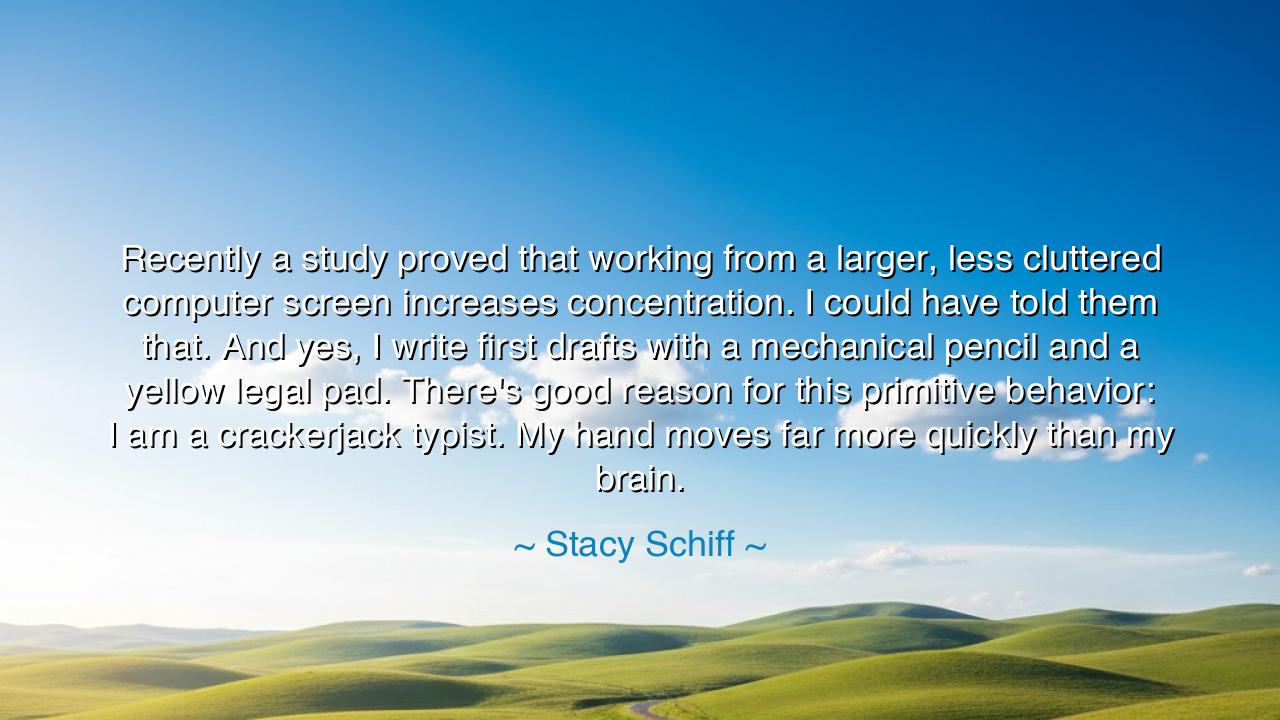
Recently a study proved that working from a larger, less
Recently a study proved that working from a larger, less cluttered computer screen increases concentration. I could have told them that. And yes, I write first drafts with a mechanical pencil and a yellow legal pad. There's good reason for this primitive behavior: I am a crackerjack typist. My hand moves far more quickly than my brain.






There are truths about creation that technology can never replace, and Stacy Schiff, a writer of immense precision and patience, captures this eternal lesson in her words: “Recently a study proved that working from a larger, less cluttered computer screen increases concentration. I could have told them that. And yes, I write first drafts with a mechanical pencil and a yellow legal pad. There's good reason for this primitive behavior: I am a crackerjack typist. My hand moves far more quickly than my brain.” In this reflection, Schiff speaks not merely of writing, but of the ancient balance between thought and speed, between the machinery of the modern age and the quiet rhythm of human reflection. She teaches that creation thrives not in haste, but in harmony — when mind and hand move together, guided by the steady pulse of understanding.
The origin of this quote lies in Schiff’s own discipline as a biographer and historian — a craft that demands not only intellect, but contemplation. Her words may sound humorous, even self-deprecating, yet they reveal a profound truth: the tools we use shape the way we think. The yellow legal pad, humble and archaic, becomes for her not a limitation, but a sanctuary. The mechanical pencil slows her, forcing her to linger with her thoughts, to let ideas form before the hand gives them shape. The computer, fast and efficient, demands instant response — but the soul of creation often resists such velocity. In returning to the simple instruments of the past, Schiff honors the ancient pace of thought, that slow, sacred unfolding through which insight is born.
Her admission — that her hand moves “more slowly” than her brain — reveals the paradox of modern genius. In the digital age, we can type, transmit, and publish at lightning speed, yet our minds, bound by the rhythm of reflection, cannot evolve as quickly. Schiff’s words remind us that wisdom requires delay. Like the sculptor who carves marble with measured blows, the writer must allow the mind’s hesitations to guide the hand. To write too swiftly is to outrun the depth of one’s own thought. In slowing herself, Schiff does what the philosophers of old did in their scroll-lined studies: she listens to her own mind before forcing it to speak.
Consider Leonardo da Vinci, who filled thousands of pages with sketches, questions, and half-finished notes, each line born of contemplation, not completion. His genius lay not in how fast he could draw, but in how deeply he could see. Schiff’s preference for pen and paper mirrors that same wisdom. She resists the seduction of ease, choosing instead the discipline of imperfection. The yellow pad, with its scribbles and erasures, captures not only words but the movement of thought itself — raw, uncertain, alive. Like Leonardo, she knows that creation is not a mechanical act, but an act of patience, of wrestling with silence until truth emerges.
Her remark about “primitive behavior” is not mockery but reverence. She calls it primitive as one might call fire primitive — ancient, elemental, indispensable. In the race toward innovation, we forget that the old ways often guard secrets that progress cannot replicate. The slowness of handwriting trains the spirit in attention; the tactile resistance of paper keeps thought grounded in the real. When Schiff writes longhand, she enters a dialogue with her own consciousness, unmediated by the blinking cursor or the algorithmic distractions of the screen. In this, she stands as a guardian of mindful creation, a reminder that mastery is not found in acceleration, but in awareness.
There is also humility in her confession. “My hand moves far more quickly than my brain,” she says — but what she truly reveals is the humility of a creator who knows the limits of her own mind. In every art, the ancients taught that one must bow before the process. To hurry the act of creation is to break its natural rhythm, to force the river of thought to flow faster than its source allows. The wise artist learns to respect that pace, to let the mind catch up to the hand, and the heart to catch up to both. Schiff, in her quiet wisdom, embodies this humility, reminding us that creation is not conquest, but communion.
Let this teaching, then, be preserved for all who live in the age of distraction: slow down the hand, and the mind will deepen. Whether one writes, paints, builds, or simply thinks, the speed of the tool must never exceed the depth of intention. The world may celebrate efficiency, but truth is found in patience. Follow Schiff’s example: return to simplicity when complexity overwhelms you; return to stillness when speed consumes you. The yellow pad, the pencil, the quiet hour — these are not relics of the past, but instruments of clarity. For the heart that creates must first learn to listen, and the mind that writes must first learn to wait.






AAdministratorAdministrator
Welcome, honored guests. Please leave a comment, we will respond soon